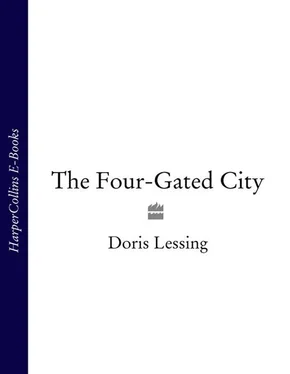But they were not in houses like this one.
There was nothing to stop Martha leaving. She had only to pack her cases and go. Well, why didn’t she? She couldn’t – any more than she could not have come here in the first place. Besides, where was she to go to? For instance, several times she had been to Mark’s old nurse’s home in the country, to visit Francis, or to take him there, or to bring him back home. That house, in its old village, with its quiet people, was England, as one had always imagined it. Except that ten miles away was a war place where new atomic weapons were being developed, in secret; and forty miles away in another direction was a factory for the manufacture of gases and poisons for use in war. Mary Butts and Harold Butts, gardened, grew vegetables, kept chickens, made presents of fresh eggs and flowers to Francis to take back to the big city London: which they disliked, it was too noisy, they said. They were a couple in their fifties. Harold Butts had always been a gardener; for many years with Margaret. Mary Butts had always been a children’s nurse. They had served the Coldridges while they worked, and served them still in their retirement. They were infinitely kind and good people. To Martha, a friend of young Mark’s, they were kind, and they asked her to stay. In a little cottage bedroom that smelled all through the summer of the flowers Harold Butts grew, Martha lay and thought, yes, this is England, this was what they meant when they said England. This is what my father meant: he grew up in a place like this. The Butts never mentioned the death factories so close to them. For one thing, England is not a small country for those who have never left it, and ten miles, forty miles, are large distances. For another, these were people who did not understand … what? Harold Butts had fought in the First World War. In France. But horror, anarchy, happened in other countries, not in England.
If Martha had lived in that cottage, she could not have forgotten those factories. Lying awake in a flower-scented bedroom, the Butts gently asleep past one wall, and Francis asleep past another, she was made to think of the difference between herself and them. Being what she was, it would make no difference if she stayed with the Butts, found work in the pretty village. She might as well go back to the house in London. The Butts were a refuge, reminders that sanity could exist. Nastiness simply bounced off them. Very early in the bad time, they had been visited by a man called Mr Bartlett. They had been distressed by the visit. Mary Butts had written a letter to Mark: ‘He seemed a nice enough gentleman, but Mr Butts thought it was not his place to ask questions about you behind your back. Mr Butts said to him, you should be asking Mr Coldridge such things. He said it to him straight. Our love to little Francis. Yours respectfully, Mary Butts.’
Before this letter reached Mark, he had already been visited by Mr Bartlett who used the ordinary forms of social life to arrive for tea in the drawing-room. He said he had been an old friend of James, the dead brother. Mark, offering tea, and cake, talked to a man who had known James at Cambridge. He had also visited Margaret. He was an old chum of Margaret’s – well, who was not? Ottery Bartlett talked of recent meetings with Margaret, and Mark, who was not by nature a suspicious man, waited for him to come to the point. He was interested in literature perhaps? Needed help with a book he had written? Mr Bartlett talked about Colin. They discussed pleasantly, for some time, the gap between the way Colin was being seen, as a spy, and the way Colin saw what he had done (if he had), which was a proper exchange of scientific information between colleagues.
Tea-time passed into a drinks-time, which soon was dinner-time. Martha cooked and served an informal kind of dinner, and was present. She was preoccupied with other things, and did not think about Mr Bartlett except that it was nice for Mark that at least one of the old friends of the family was prepared to visit him. For Mark was obviously touched by it: his warmth with Mr Bartlett told Martha how much he had been feeling his isolation. During dinner they talked about Sally-Sarah and Mark’s relation to Paul. Mr Bartlett was sympathetic about Lynda – he had known her, long ago; and was sympathetically interested in Martha’s presence in the house. After dinner Martha left the two men with their brandy. Late that night Mark burst into her room, when she was nearly in bed, demanding that she must come down to the study at once. It had just dawned on him: it had just made sense. He, Mark, was the most incredible fool: a hundred times during the afternoon and evening he could have seen what Ottery Bartlett was, if he had been awake. He now needed Martha to retrace the conversation with him. He had gone past ordinary anger into a state of sick quivering rage where he kept bursting into inarticulate exclamation and protests. They could not follow any train of thought. They could not discuss anything that night: Mark drank himself silly. What was upsetting Mark worst was that the man had used James, the family, to come here.
Next day, came the letter from Nanny Butts, and fresh anger. When this cooled, they were able to discuss what had happened.
The man was probably from the Foreign Office, but could be from any one of the six or so secret services that operate in Britain. He had mentioned Hilary Marsh once, but that proved nothing. Anyway, it was not important. They (who?) thought that Mark knew where his brother was. If not, that he was at least in contact with him. And that he was probably a secret member of the Communist Party. If so, he might drop useful information about the Communist Party. (And if he had been he certainly would have done, so incredibly obtuse Mark had been for the whole of an afternoon and an evening.) Finally, Mark, if handled right, might be prepared to become an agent for Britain, whether a member of the Communist Party or not. This last point was not reached by Mark and Martha for some days. But, going over and over the talk of that day, they could put their fingers on a dozen moments where it had been reached – very delicately of course, only hinted at. ‘A spy!’ said Mark. ‘Me! A spy!’
And so, Martha could see, Colin had probably reacted, when with his version of Ottery Bartlett: What! me! Colin Coldridge! A spy!
And for some hours, Mark went over and over, back and around that incredible fact: Hilary Marsh, Ottery Bartlett, were gentlemen. Yet they were prepared to do such work. He could not believe it. He certainly did not understand it.
It was this incident that sent him off into another week of silent misery in his study, with bottle after bottle of cognac. And it was that incident, the visit of Ottery Bartlett, that had given birth to a new personality. Before that, he had been Mark Coldridge as Martha had first known him – under stress of course; miserable, out of his depth, but himself.
There is a certain kind of Englishman who, on learning that his country (like every other) employs spies; or (like every other) taps telephones, opens letters and keeps dossiers on its citizens; or (like every other) employs policemen who take bribes, beat up suspects, plant information etc. – has a nervous breakdown. In extreme cases, such a man goes into a monastery, or suffers a sudden conversion to whatever is available.
An Englishman of this type has of course been the subject of amused and indeed affectionate speculation among other countries for generations. Though sometimes not so amused, or affectionate.
During the course of that week, Martha went into the study, where Mark, red-eyed and half-drunk, was walking up and down and around and around, to tell him the following story which had once come her way.
Sometime in the course of the Second World War, a certain member of a certain British Secret Service had been instructed to go to (let us say) Istanbul to find out the probable intentions of the Russians in regard to something or other. The place where he would most likely get this information, he was told, was the bed of the wife of a British official. She had proved in the past a mine of information, being indiscreet as well as beautiful. For she could never resist a Russian. The hero of this anecdote departed to the city in question in pursuance of duty, but did not return when expected. He was summoned. Back in London, interviewed by his principals, he confessed that he had learned nothing. Yes, the lady was beginning to attract him, he said. But he found her morals distasteful, and besides he had known her husband for years.
Читать дальше












